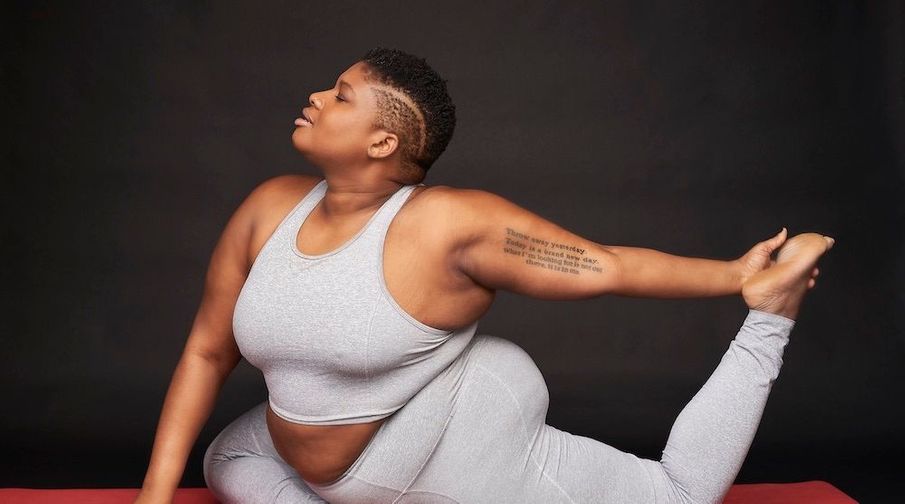Yoga teacher and body positivity advocate Jessamyn Stanley is passionate about shattering the illusion that yoga is for one type of person. Here, she reveals how she discovered yoga, and the lessons she takes off the mat and into her life
Hi Jessamyn! When did you first find yoga?
I fell in love with yoga in my early 20s, while managing a wave of depression and looking for balance in my life.
Even though the physical practice was extremely challenging, none of the postures felt accessible, and I was often the only fat and black person in my classes – I still found a part of myself in yoga that had been dormant until then.
You tell your students to ask, ‘How do I feel?’ rather than, ‘How do I look?’ when practising yoga. How do you feel when you’re doing yoga?
During a postural yoga practice, I tend to feel like it’s a rare opportunity to come into full connection with my physical body. My tendency towards body dysmorphia and depression means that I can get out of touch with my body rather quickly, and yoga helps pull me back to the moment so that I can take ownership of this incredibly powerful machine that I’ve been granted during this lifetime.
What does ‘body positivity’ mean to you?
Body positivity means: “You are OK, today.” It means that everything about you is, in this moment, exactly as it needs to be. You don’t need to change anything, you don’t need to worry about tomorrow. You are OK, today.
Do you have any tips for someone looking to break away from an idea of a ‘right’ way to practise yoga?
There is no ‘right’ way to practise yoga because every practise of yoga is perfect, whether it’s on or off the mat. My advice is to stop paying attention to yoga media, companies, and individuals who promote yogic exceptionalism.

Photography | Bobby Quillard
In an Insta post, you describe your yoga as: ‘Messy and complicated and NSFW and vulgar as fuck.’ What do you mean by that?
Yoga is not actually about the pretty, traditionally Instagrammable moments. The practice occurs both on and off the yoga mat – legit, practising the postures and breathwork in a class is just preparation for applying the same themes to every other moment of life. And in the same way that I stumble and fall on the yoga mat, I stumble and fall off the mat as well. Often, I do more than stumble, and things can get very messy and complicated and NSFW and vulgar, very quickly.
You’ve spoken about ‘stepping into your sexuality’ at the age of 32. Why is now the time?
I think I’ve probably become more comfortable in my sexuality because I’m getting older, and it’s much easier to not give a fuck about what other people think than it’s ever been in the past. I’ve also come to understand that a healthy connection to my sexuality is an imperative part of knowing myself as a fully evolved human being, and not just knowing a paper doll cut-out, one-dimensional version of myself.
When things get tough, what makes you feel better?
On the difficult days, I let myself feel bad and try to resist the urge to guilt myself for feeling depressed – usually, this is the hardest part and takes the longest. If a shitty situation has snuck up on me out of nowhere, I always try to focus on breathing my way through it. And, as soon as I possibly can, I try to get into a self-love cocoon of tarot cards, essential oils, meditation, bubble baths, and healing crystals.
Jessamyn Stanley is an author, intersectional activist, and founder of ‘The Underbelly Yoga’, a wellness programme app available internationally this winter


Comments